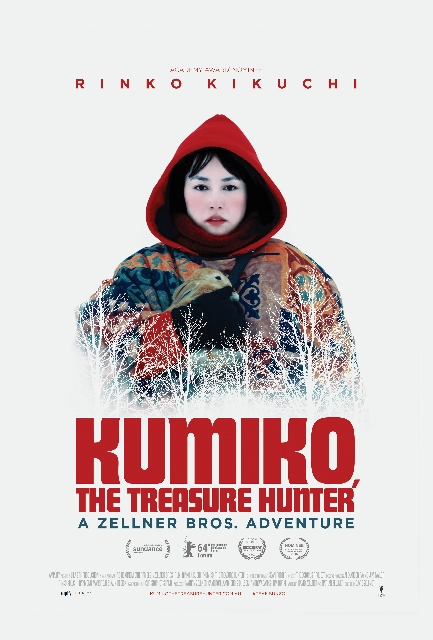Sometimes it’s hard to tell if Kumiko The Treasure Hunter is trying to be a tragic tale about a young woman suffering from a form of mental illness, the story of a misunderstood free spirit, or a dryly humorous character study. After thinking about it, I now believe it wants to be all three.
If nothing else it’s the kind of film that could convince viewers it was about either, or perhaps something unconsidered altogether. But if you’re looking for a valiant and uplifting story about a plucky heroine overcoming the odds, you’ll probably be disappointed- that’s not the kind of story writers/directors Nathan and David Zellner are aiming for here.
One area where Kumiko succeeds is as a tribute to an even better film, the 1996 Coen brothers classic Fargo (my favorite movie of that year opposite Space Jam). The Zellners’ inspiration for the story was an urban legend regarding Takako Konishi, a real life office worker from Tokyo whose body was discovered in a field in Detroit Lakes, MN.
Kumiko’s quest is an adaption of said legend, as the rumor mistakenly states Konishi had become obsessed with Fargo and finding the treasure Peter Stormare and Steve Buscemi had buried in the snow. Of course that was all prior to the very fictional Marge Gunderson’s investigation and that infamous wood chipper, but Kumiko’s boredom, frustration and sense of alienation as an aging secretary (at 29, oddly enough) with an unsympathetic boss proves to be too much.
Over the course of the film Kumiko reluctantly chats with her concerned mother over the phone, who pressures her to settle down with a nice guy. Depending on your interpretation this could be taken as either a domineering parent trying to force a child into something or a worried mother trying to bring her daughter back to reality, but either way it becomes motivation for Kumiko to escape her normal life. Under the guise of buying a gift for her superior and after stealing a map from a reference book, she parts with her pet rabbit Bunzo (Bunzo, as himself) and takes the company credit card on her journey to Minneapolis in hopes of finding the film’s famous suitcase and striking it rich.
Few people in either Tokyo or Minnesota know quite how to respond to Kumiko’s one track mind and distant nature, conveyed effectively in a strong performance from Rinko Kikuchi. She’s intentionally locked herself away in her own world, her actions becoming more isolated and erratic over the course of her journey. Luckily the strangers she meets aren’t caricatures or eccentric personalities in their own right, just ordinary folks on the street. David Zellner himself plays a policeman who approaches Kumiko in as helpful and matter-of-fact a manner as possible, a great contrast with her almost overwhelming sense of detachment.
Sean Porter’s cinematography focuses on highlighting negative space, especially in the snowy fields of the film’s second half- a good choice for a story whose protagonist’s life is gradually unravelling. There’s a lot of white and soft blue tones that make Kumiko’s consistently bright red color scheme in her outfits stand out. For a character who seems so unreceptive to human kindness, her feelings and motivation don’t necessarily feel foreign.
I personally think Kumiko is gradually going mad, and the ambiguity of the climax doesn’t do much to convince me otherwise. But Treasure Hunter is nevertheless told from her perspective, and despite how irrational and removed from reality her goals are, there’s still an odd universality to her desire for something better. It doesn’t quite match up to Fargo’s greatness, but on its own it’s a cute, if somewhat droll and morbid tribute to another tragicomic movie, without being excessively meta. Slightly recommended.



